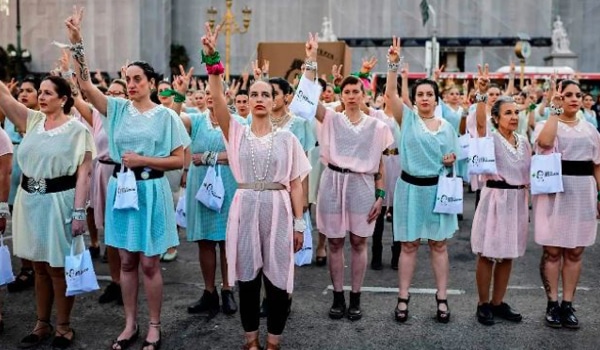
“Two weeks before Argentina’s elections, a group of femalecongressional candidates addressed a euphoric crowd that had travelled fromacross the country to the town of La Plata for a 200,000-woman weekend offeminist strategy workshops and marches,” writes Foreign Policy. The electionsthis month included several “outspoken feminist candidates”, while protestsagainst gender-based killing of women, national women’s strikes, and a “campaignthat saw abortion nearly legalised in the National Congress last year” amountto what is being called “the revolution of the daughters”.
The administration of former president Macri expandedtelephonehotline assistancefor gender-based violence and free access tolong-lastingbirth controlmethods, built more than 240newdaycares, and established Argentina’s firstdailytelevision programme devoted to gender equality.After the Macri administration introduced a campaign to reduce unwanted teenagepregnancy, teen births in Argentina dropped12%in two years.
But the Centre-Left candidate, Alberto Fernández, has been elected the new president of Argentina with more than the 45% of the vote needed to win. Former president Cristina Fernández de Kirchner was also elected, as his vice-president. The election was dominated by economic concerns. The country is in the midst of an economic crisis that has left a third of the population in poverty. Many say things are worse now than when the conservative took the reins of power from the controversial government of Cristina Fernández de Kirchner in 2007-2015. The new president has taken more liberal positions than former president Macri on certain social issues, most notably support for decriminalising abortion. But how much support exactly?
Alberto Fernández raised the issue of abortion twicewhile campaigning. The first time was on 14 October, during the firstpresidential debate, when he said: “I will not avoid the issue ofabortion, as everyone knows what I think. To continue punishing women onlycriminalises the behaviour and makes it go underground. We must move tolegalisation, because with legalisation we will give poor women the opportunityto have an abortion under aseptic conditions, as rich women already do inprivate clinics. Let’s end the hypocrisy.” Then in the week before the vote, ina radio interview, he said: “Abortions are clandestine. It is a matter ofpublic health and it must be resolved. We cannot continue being hypocrites;once and for all, we must stop putting the lives of young women at risk.”
But will he take legislative action any time soon, when hehas a failing economy to rescue? While campaigning, he sought support from manydifferent groups. Now that he has been elected, will he make safe abortion apriority? Mrs Fernándezde Kirchner, whose support was important for his victory, always refused to touch thesubject of abortion during her presidency, Moreover, during the transitionperiod to the new government, two of the four people the new president has alreadyappointed are said to be very close to the Pope.
The Campaña Nacional por el Derecho al Aborto Legal, Seguroy Gratuito (National Campaign for the Right to Legal, Safe, Free Abortion) planto re-launch their call for law reform in 2020 at the legislative level. So Mr Fernández will not beable to forget what he said…
SOURCES: Foreign Policy, by Catherine Osborn, 23October 2019 ; BBC News, 27 October 2019 ; New York Times, by Ernesto Londoño, 27October 2019 ; Clarin, Elecciones, 26 octubre a 31 octubre2019 (en español)PHOTO: Ronaldo Schemidt/AFP/GettyImages in Foreign Policy. Womendressed like former first lady Eva Perón celebrate the anniversary of women’ssuffrage and denounce the policies of the Macri government, Buenos Aires, 23September 2019.



